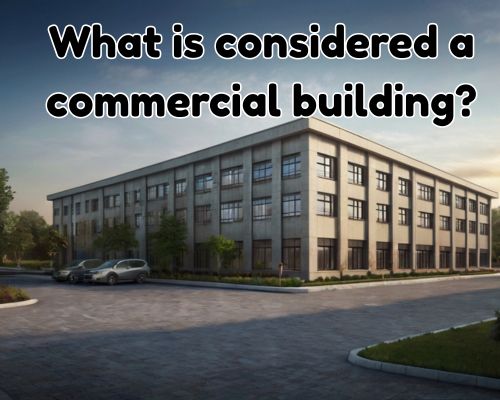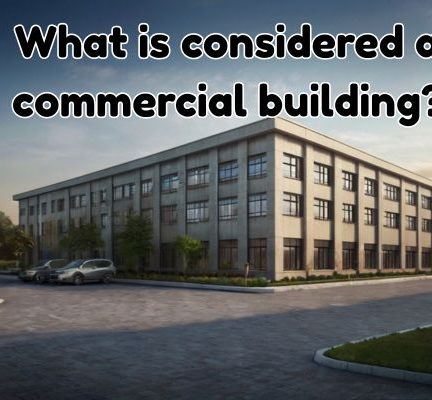When you hear the term commercial building, what comes to mind? Is it just any structure that isn’t a home? Or is there more to it? In New Jersey — a state bustling with diverse industries, from finance hubs in Jersey City to bustling retail centers in Newark — understanding what qualifies as a commercial building is crucial for investors, business owners, developers, and residents alike.

With Charles Jimerson of CJ Commercial Roofing NJ, we’ll unpack the definition of a commercial building, explore different types of commercial properties, and highlight local regulations and considerations in New Jersey to give you a clear, SEO-optimized insight into this essential real estate category.
Defining a Commercial Building: The Basics
At its core, a commercial building is any structure used primarily for business activities rather than residential living. These buildings are designed and zoned to facilitate commercial operations — from selling goods and services to housing offices or industrial activities.
Unlike residential buildings, which are meant for dwelling, commercial buildings serve economic purposes. In New Jersey, this distinction is not just theoretical; it has real implications for zoning laws, property taxes, insurance, and building codes.
Key Characteristics of Commercial Buildings:
- Purpose: Primarily business-oriented—retail, office, warehouse, or industrial.
- Zoning: Designated commercial zones under New Jersey local government codes.
- Design & Features: Layouts tailored for customer flow, employee workspace, storage, or manufacturing.
- Usage: Includes shops, offices, factories, restaurants, and more.
Types of Commercial Buildings Common in New Jersey
The term “commercial building” covers a wide spectrum of property types. In New Jersey’s varied landscape — from suburban areas like Princeton to urban centers like Hoboken — you’ll find many categories of commercial real estate:
1. Office Buildings
Office buildings house professional services, from law firms in Morristown to tech startups in Newark. These can range from skyscrapers to small office parks.
2. Retail Spaces
Shopping centers, standalone stores, and malls like the Jersey Gardens Outlet Mall in Elizabeth fall under this category. Retail buildings are designed for customer access and display.
3. Industrial Properties
Warehouses, manufacturing plants, and distribution centers are vital to New Jersey’s logistics sector, especially near ports in Camden and Elizabeth.
4. Mixed-Use Buildings
These combine commercial and residential uses, common in dense areas like Jersey City, blending storefronts with apartments above.
5. Hospitality and Food Service
Hotels, restaurants, and bars, crucial to New Jersey’s tourism and nightlife scenes, are also commercial properties.
For more, visit https://cjcommercialroofingnj.com/.
Why Knowing What Constitutes a Commercial Building Matters in New Jersey
Zoning and Land Use Compliance
Local municipalities in New Jersey have strict zoning laws that define where commercial buildings can be located. For example, in places like Newark or Edison, zoning codes regulate the type and size of commercial developments allowed.
If you’re planning to buy, lease, or develop a commercial property, knowing the zoning designation is essential to avoid costly legal issues.
Property Taxes and Assessments
Commercial properties are taxed differently than residential ones. New Jersey’s property tax rates and assessment formulas reflect this distinction. Businesses must factor these costs into their budgeting and financial planning.
Building Codes and Safety Regulations
Commercial buildings in New Jersey must comply with specific building codes, including fire safety, accessibility (ADA compliance), and environmental regulations. These codes ensure public safety and operational efficiency.
Financing and Insurance
Lenders and insurers treat commercial buildings differently. Loans for commercial properties have different terms and conditions than residential mortgages. Insurance policies must cover risks specific to commercial activities.
Local Salient Entities and Influences on Commercial Buildings in New Jersey
New Jersey’s commercial building landscape is shaped by multiple local and regional factors:
New Jersey Department of Community Affairs (DCA)
The DCA oversees building codes and construction permits, ensuring commercial buildings meet state safety and environmental standards.
New Jersey Economic Development Authority (NJEDA)
NJEDA supports commercial development projects, especially those aimed at revitalizing urban areas or fostering business growth.
Municipal Planning Boards
Every city and township, from Paterson to Atlantic City, has planning boards that regulate commercial zoning and development permits.
The Port of New Jersey
One of the busiest ports in the U.S., it influences the demand for commercial warehouses and distribution centers across northern and southern parts of the state.
How to Identify a Commercial Building in New Jersey: Practical Tips
- Check the Zoning Map: Local township or city websites publish zoning maps showing which areas are designated for commercial use.
- Look at the Property Use: Is the building used for retail, offices, or manufacturing? That’s a clear sign it’s commercial.
- Review Building Permits: Public records from local building departments reveal the approved use of a property.
- Consult with Real Estate Experts: Brokers and agents specializing in commercial properties can provide clarity.
- Understand the Tax Classification: Commercial buildings fall under different property tax categories.
Challenges and Opportunities in New Jersey’s Commercial Real Estate Market
Urban Revitalization and Adaptive Reuse
Cities like Newark and Jersey City are transforming old industrial buildings into vibrant commercial spaces, blending history with modern business needs.
Growing Demand for Warehousing
The e-commerce boom has pushed demand for warehouse space near major transport hubs like the New Jersey Turnpike and ports.
Environmental and Sustainability Trends
Green building certifications and energy-efficient design are increasingly important for commercial developments, aligning with New Jersey’s environmental goals.
Conclusion: What Is Considered a Commercial Building in New Jersey?
In essence, a commercial building in New Jersey is any property primarily designed and used for business activities — whether it’s a high-rise office in Jersey City, a retail store in Princeton, or a warehouse near the Port of Newark.
Understanding this classification is vital for compliance with local zoning laws, managing taxes, securing financing, and ensuring safe, efficient operation. With New Jersey’s dynamic economy and diverse urban and suburban landscapes, commercial real estate remains a cornerstone of growth and opportunity.
Whether you’re a business owner, investor, or simply curious, knowing the ins and outs of commercial buildings in New Jersey positions you to navigate this complex market confidently.
